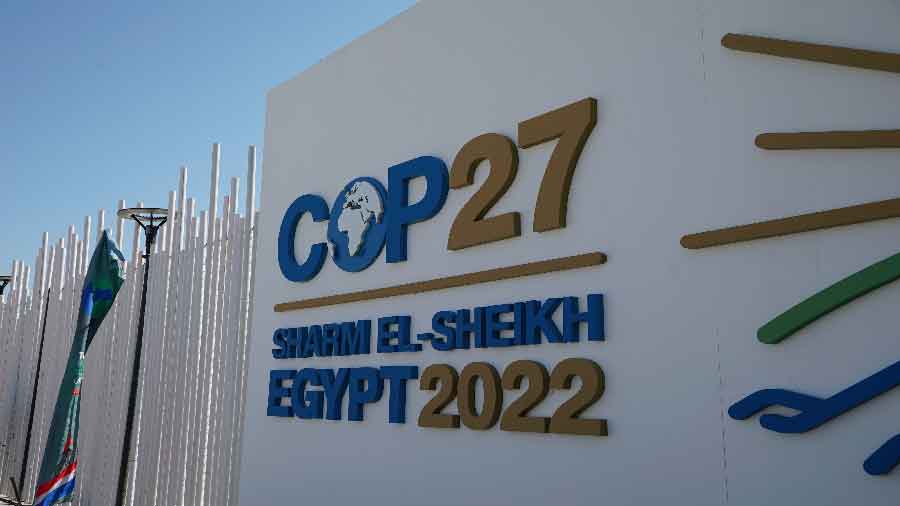No call for fossil fuel cuts, climate cash
India on Tuesday told the Cop27 climate summit here in Egypt that it was making an “arduous effort” to battle climate change although “our contribution to the world’s cumulative emissions so far is less than 4 per cent”.
The Union minister for environment, forest and climate change, Bhupender Yadav, delivered the country’s national statement at the summit.
Mission LiFE — or “Lifestyle for Environment”, the pet programme of Prime Minister Narendra Modi — was the “heart of India’s vision”, Yadav said.
LiFE, said to be a pro-people and pro-planet effort that seeks to shift the world from mindless and wasteful consumption to mindful and deliberate utilisation of natural resources, accounted for 126 words of the 437-word statement.
The statement did not touch upon the key issues being deliberated at Cop27, such as financial support from developed countries and fossil fuel cuts.
Many developing nations had mentioned these in their agenda.
“The statement has nothing on the key issues here, perhaps for strategic reasons,” a senior climate expert at Sharm El-Sheikh said.
He, however, said India was more proactive at Cop27 than at earlier editions.
“Once the negotiation text is available, we will understand how much India could push through in its agenda, particularly the phase-out of all fossil fuels rather than only coal,” the expert said.
Yadav said at the plenary address: “India, home to 1.3 billion people, is undertaking this arduous effort, despite the reality that our contribution to the world’s cumulative emissions so far is less than 4 per cent and our annual per capita emissions are about one-third of the global average.”
The minister said within one year of the Prime Minister announcing India’s commitment to achieve net-zero carbon emission by 2070, the country had submitted its “Long-Term Low Emissions Growth Strategy” indicating low-carbon-transition pathways in key economic sectors.
The country seeks to foster strong international cooperation through coalitions like the International Solar Alliance and the Coalition of Disaster Resilience Infrastructure, both of which were launched and nurtured by India, Yadav added.
Independent experts, however, pointed out that India’s long-term strategy was basically a packaging of old commitments and short on data and specific targets.
“Though India’s long-term strategy of transition from fossil fuels, released at Cop27, is an encouraging step…, the policymakers must now develop specific targets in a timebound manner,” said Harjeet Singh, head of global political strategy at Climate Action Network International.
Yadav said in response to the call for increased ambition in its 2030 climate targets, India had in August updated its Nationally Determined Contributions, the voluntary emissions cut commitments made by countries, and turned that into a formal pledge.
The minister spoke at length on LiFE, an initiative Modi announced at Cop26 in Glasgow in 2021 and formally launched in the presence of UN secretary-general Antonio Guterres on October 20, 2022, in Gujarat.
“At the heart of India’s vision of a safe planet is a one-word mantra — Lifestyle for Environment, that Prime Minister Modi set forth in our national statement at Cop26,” he said.
“The world urgently needs a paradigm shift from mindless and destructive consumption to mindful and deliberate utilisation…. As the world’s most populous democracy and a vibrant emerging economy, India seeks to lead by example, and invites the global community to be a part of Mission LiFE for individual, family and community-based actions,” Yadav said.
Article Credits: The Telegraph

Pingback: The World Cup In Qatar Is a Climate Catastrophe - SLSV - A global media & CSR consultancy network